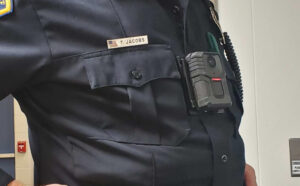With officers from Ferris’ Department of Public Safety fully outfitted with body cameras, DPS Chief Abe Haroon declared the initiative completed and “rubber stamped.”
At a time of heightened concern for safety on college campuses, DPS officers will now turn on their body cameras anytime they have contact with a person for a call or service. Haroon sees battery life and privacy concerns as the only issues to navigate moving forward.
DPS recognizes the issue of privacy as it pertains to students. One way they have addressed this is by creating policies when interacting with students or within the dorms.
“Written into the policy is that officers have the discretion to turn off the visual recording of a camera upon the request of a reporter or a victim,” Haroon said.
This policy is to allow a student’s protection regarding the privacy of their home and self as long as they are not a suspect. While there is a current policy for redacting written files and audio to accommodate the Freedom of Information Act and the Family Education and Privacy Act, DPS does not have a way to censor video information at this time.
“For the first time we are being involved with something where we might have to redact,” Haroon said. “We don’t have that capacity now, but they are gonna demo some software to me… that will have those redaction features built into it.”

Some members of the Ferris community already appreciate this concern for privacy.
“I do think that these policies are pretty darn close to the ideal situation,” software engineering sophomore Chandler Schroeder said. “If I say I don’t want to be on camera, that should be respected.”
Currently, the cameras have a battery life of around 12 hours. Haroon has concerns that this leaves room for battery failure during an officer’s shift. One of the ways he has tried to solve this is by providing officers with chargers for their cars.
“The way the device works is it constantly records,” Haroon said. “Imagine your phone is recording for 12 hours. It’s gonna drain the battery.”
The cameras have a replay feature that requires the camera to be recording at all times. The camera captures one minute of footage before the officer presses the record button, which means the camera is always recording, but it does not save data until the officer starts recording.
The replay feature is a contingency plan for any time an officer may fail to turn on the camera or try to manipulate footage in any way. It also introduces the issue of data storage, as recording a whole shift would create 100s of gigabytes of data.
A minute may not be enough, but Haroon explains that the replay can be extended if it becomes an issue. After an officer’s shift, the recordings are uploaded to a cloud based storage system once the camera is docked on the battery charger. Before a camera is docked, it is reported that even Haroon cannot access the local drive of a camera.
“I would be concerned with third party cloud based data storage,” Schroeder said. “What is the track record of this company? Have they had data breaches? What kind of data breaches?”
Haroon believes that the cloud storage is a stronger, more reliable option.
Detective Sgt. Timothy Jacobs is happy to have the cameras. He sees it as a protection to him and the students surrounding complaints and misconduct. The only issue that Jacobs has had is learning how to use the equipment.
“I haven’t had any annoyances with the camera, just with myself on the learning curve,” Jacobs said. “They give you a pretty hard test for the [cameras]… You have to know the subject matter.”
Although there are some finer details to address, DPS has the equipment and policy surrounding body cameras that will be in operation for the next five years. The only foreseeable changes are related to the hardware as upgrades in resolution, battery and storage become available.
